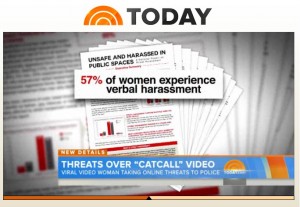Continuing on from Part 1 —
New Research:
 Global: ActionAid released the Women and the City III report. This report reflects the experiences of over 3,000 women and girls living in urban communities in Brazil, Bangladesh, Cambodia, Liberia, Nepal, South Africa and Zimbabwe.
Global: ActionAid released the Women and the City III report. This report reflects the experiences of over 3,000 women and girls living in urban communities in Brazil, Bangladesh, Cambodia, Liberia, Nepal, South Africa and Zimbabwe.
Global: The World Economic Forum released their annual Global Gender Gap Report in late October. Yet again, no country has achieved gender equality. Street harassment perpetrated by men against women is one more indicator and manifestation of this inequality.
Global: Hollaback! and Cornell University conducted a large-scale, opt-in survey on street harassment in 2014. The research included 16,600 respondents in 42 cities from around the globe was released in May 2015.
Australia: A new study by the Australia Institute revealed that street harassment is very common. “The survey of 1426 females found 87% were verbally or physically attacked while walking down the street and men were responsible for 52% of the attacks. 40% of women feel unsafe in their own neighbourhoods at night…In addition to verbal harassment, physical street harassment is also a relatively commonplace occurrence, with 65% of women experiencing physically threatening harassment.”
Australia/USA: “Michael Kasumovic and Jeffrey Kuznekoff, researchers at the University of New South Wales and Miami University, respectively…watched how men treated women during 163 plays of the video game Halo 3. As they watched the games play out and tracked the comments that players made to each other, the researchers observed that — no matter their skill level, or how the game went — men tended to be pretty cordial to each other. Male players who were good at the game also tended to pay compliments to other male and female players. Some male players, however — the ones who were less-skilled at the game, and performing worse relative their peers — made frequent, nasty comments to the female gamers. In other words, sexist dudes are literally losers.”
Chile: The group Observatorio Cotra el Acoso Callejero – OCAC Chile released the results of their second study on street harassment. “Among the findings of the study, three out of four people have suffered street harassment in Chile in the last 12 months … In the case of women, the percentage reaches 85% and of men, 55%. … Also, two in five people have suffered rubbing, touching or groping in public spaces, and 23% of women have experienced some form of serious harassment (persecution, exhibitionism, public masturbation).”
France: A new study found that 100% of women had been harassed while riding public transportation.
Kenya: A new study found that a short educational program produced lasting improvements in teenage boys’ and young men’s attitudes toward women, thus helping to reduce violence against women.
Kenya: More than 50% of almost 400 women interviewed by Kenyan advocacy group Women’s Empowerment Link (WEL) said they had experienced gender-based violence, defined as physical, sexual or psychological harm, while using public transport. “(Respondents) witnessed female passengers being stripped naked … but the female survivors neither received any help nor reported the violation,” WEL said in a report of the survey. Respondents said insults were the most common form of abuse that women experience while using public transport, followed by being forced to board vehicles against their wishes and indecent touching.”
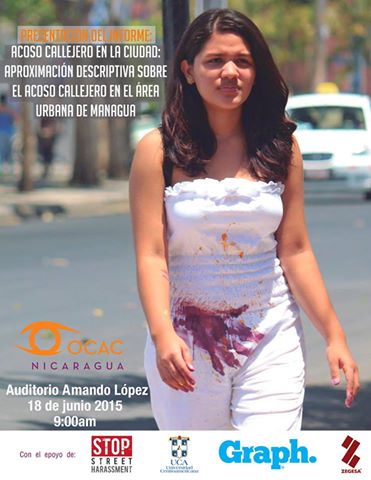 Nicaragua: Our 2014 Safe Public Spaces Mentoring team in Nicaragua officially released a report detailing the findings of the 900 person survey they conducted last year. Their report and findings were featured by numerous media outlets, including La Prensa.
Nicaragua: Our 2014 Safe Public Spaces Mentoring team in Nicaragua officially released a report detailing the findings of the 900 person survey they conducted last year. Their report and findings were featured by numerous media outlets, including La Prensa.
Nigeria: The National Democratic Institute (NDI) in collaboration with the International Federation of Women Lawyers (FIDA), USAID and other partners found that “sexual harassment, intimidation and lack of support as some causes for the declining rate of women’s participation in elections.”
Syria and Jordan: There was new research in a publication from SIT Digital Collections, “A Comparative Analysis of Syrian Refugees’ and Jordanian Citizens’ Experiences of Street Harassment in Jordanian Host Communities”
USA: A new study shows that the treatment of women as sexual objects – including through street harassment — contributes to their anxiety over their physical safety. “Catcalling is More Sinister Than You Might Think.” “The study looked at a sample of 133 African-American and 95 white female undergraduates… The African-American respondents reported more sexual objectification experiences and fear of crime than white women, and therefore experienced more psychological stress.”
USA: The Los Angeles transit authority found 19% of riders have been harassed in the past year. “Seven percent have been fondled or groped, and 8% have been subject to indecent exposure…passengers younger than 18 reported the highest rate of unwanted touching of any age group.”
USA: “Study shows how men overcompensate when their masculinity is questioned.”
USA: Our board member Dr. Laura S. Logan, an Assistant Professor of Sociology at Hastings College, wrote “Street Harassment: Current and Promising Avenues for Researchers and Activists” for the academic journal Sociology Compass. In it she makes the case for why researchers in particular need to focus on street harassment.
USA: The Safe Routes to School National Partnership included street harassment in its new report! This is so important because a lot of kids and teenagers face street harassment as they travel to/from school and school activities. We need to acknowledge and address that.

** Here are 40 studies about how prevalent street harassment is in different parts of the world.**
Notable News Stories:
Bangladesh: The celebration of the Bengali New Year 1422 was interrupted by a mass sexual assault against a group of women on the campus of Dhaka University.

China: After weeks of imprisonment, five female activists were released. They were detained after trying to start a campaign against sexual harassment on public transportation. Free Chinese Feminists were crucial in their release and worked tirelessly to free these brave women. #FreetheBeijingFive
Costa Rica: Mr. Cruz was best known as the man who confronted another man for filming an upskirt video in San Jose. He was then stabbed multiple times two days later while walking through San Sebastian. He died a few weeks later after being in intensive care.
Egypt: 141 sexual harassment incidents were reported during Eid al-Fitr.
India: A teenager killed herself after enduring street harassment. – “A family member of the victim said, “We had gone to the police and complained about the incident. They did not take appropriate action against the guilty, which led to the girl’s death.”
India: A girl set herself on fire over alleged street harassment.
India: Harassers stabbed a 19-year-old woman 35 times, killing her.
Ireland: Jenny Stanley wrote an open letter for the Irish Times that prompted global discussions.
South Africa: Sisonke Msimang’s New York Times op-ed “The Backlash against African Women” explores how “public strippings represent the front lines of a cultural war against women’s advancements in traditionally conservative but rapidly urbanizing societies. They aren’t really about what women are wearing. They are much more about where women are going.”
UK: Train passengers stood up for two Muslim women after a man threatened them with anti-Muslim slurs.
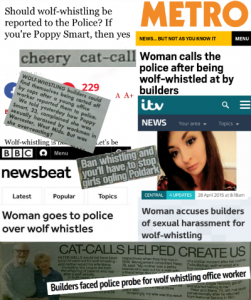 UK: After weeks of trying various tactics for dealing with street harassers along her route to work (this included men purposely blocking her path), Poppy Smart took the matter to the police. When her story was public, lots of people said she should get a thicker skin, change her route to work, and stop wasting police time. This led to lots of discussions and articles for and against her choice to report.
UK: After weeks of trying various tactics for dealing with street harassers along her route to work (this included men purposely blocking her path), Poppy Smart took the matter to the police. When her story was public, lots of people said she should get a thicker skin, change her route to work, and stop wasting police time. This led to lots of discussions and articles for and against her choice to report.
UK: A BBC reporter was street harassed while on air, filming a segment about street harassment.
USA: “A teenager from Louisiana required surgery after being attacked by a group of men who had harassed her while she was wearing a bikini.
USA: A young boy stopped a man who was street harassing a female runner.
USA: A young woman in Iowa City (USA) was murdered at a shopping mall by an entitled male mall security guard after she reported him for sexual harassment and he was consequently fired. In a separate incident, a group of men harassed a woman in Ames, Iowa, when bystander Cale Truhlsen stepped in to try and stop it. The other men attacked him, injuring him so badly he was hospitalized.
USA: “There is a moment in the McKinney, Texas, pool party video that’s both horrifying and absurd: when Cpl. Eric Casebolt manhandles, violently restrains, then sits on top of an unarmed, 15-year-old, bikini-clad black girl as she cries for her mother.”

USA: “Ohio Gay Man Endures Gay Slurs, Savagely Beaten After Leaving Cleveland Gay Nightclub – The attack on Jarrell was so severe it caused his brain to swell and bleed and he lost 80 percent hearing ability in his right ear. As murders of trans people continue to rise, discriminatory attacks and murders of LGBT people remain a consistent, stark reality throughout the nation.”
NEW Art, Songs, Films and Documentaries:
Canada: “Dear Stranger” is a short and powerful film by a film student in Vancouver
India: “Stripped” is a social drama broaching the most sensitive and often neglected aspect of a woman’s life. This is a story about Ana, who is a modern working girl. She’s well educated and quite liberated. Yet, whenever she has to deal with the perversion of men around her, she feels violated. Otherwise, a brave woman, she finds the act of ogling very disturbing.”
India: Women shared their first street harassment stories.
Mexico: Read the powerful street harassment stories of 76 Mexican women in Fusion’s online exhibit “‘All the Time. Every Day’: Surviving Street Harassment in Mexico City.” Artist Tatyana Fazlalizadeh spent a week there drawing portraits of women for her Stop Telling Women to Smile project, printing and posting them around the city.
Russia: Two men were harassed on video for holding hands walking down the street.
Saudi Arabia: A video that shows a group of young boys harassing two women sparked outrage.
UK: Through the ODD Arts and The Hideaway project in Manchester, young women share their street harassment stories.
USA: Empress Of’s “Kitty Kat” Is The Reponse To Street Harassment That Pop Needed
USA: In a new episode from the web series “Adult Wednesday Addams,” created by Melissa Hunter, Wednesday follows two dudes home to teach them a lesson after they catcall her.
USA: Through Immediate Justice, teenage girls share their street harassment and sexual harassment in school stories in this video and say, “I am not a cat.”
They also produced a documentary this year.
USA: Camonghne Felix performed the spoken word piece “Meat: A Reflection on Street Harassment” at The Strivers Row #BlackLivesMatter Benefit Show.
USA: Hollaback! commissioned filmmaker Aden Hakimi to make a video in which Michelle shares her street harassment stories.
USA: “Conversations About Street Harassment” is an interview series with LGBQT young people, created by transgender activist Charlie Kerr and mixed media visual artist Randon Rosenbohm.
USA: Here’s spot-on and sad social commentary about street harassment and how some men will only back off or leave women alone if they are visibly “taken” by a man.
USA: A man catcalls a woman during an anti-street harassment news report!
USA: “These teens in Fort Walton Beach, Fla. are not happy about the street harassment in the community – nor are they proud about their participation in these behaviors.” Read the accompanying Women’s eNews article.
USA: Tess Paras created the video “What If Catcalls were Cheeseburgers?” (NSFW…. here is a version that is safe for work)
USA: What happens when women street harass men using the “drive-by” tactic?
USA: “Julia Retzlaff, age 18, loves exploring her city and visiting friends all over San Francisco. But the fear of being sexually assaulted on public transportation is forcing her to reconsider going out at all. Produced for the Robert Wood Johnson Foundation’s Equity Workshop at TED 2015 in association with the Bay Area Video Coalition in San Francisco”
USA: “5 Things Women will Never Say” (“These reactions seem crazy, because you know you’re not really flirting.So, don’t be a creep.” – BuzzFeed)
USA: “Why That Viral [Cosmo] Video of Men Reacting to Street Harassment Isn’t Praise-Worthy”
USA: Taylor Yocom, a 22-year old photography student from the University of Iowa created the “Guarded” project to show what women carry to protect themselves, like mace or their keys, which they hold as a weapon.
USA: Both singers Alicia Keys and Jewel spoke out about unwanted sexual harassment and advances from men while in public spaces as teenagers and young women.

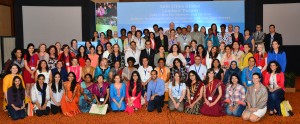

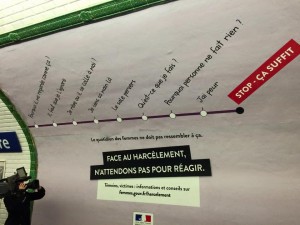
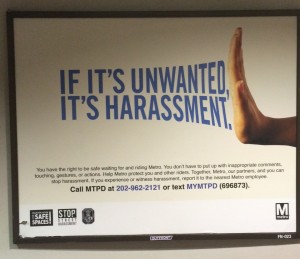

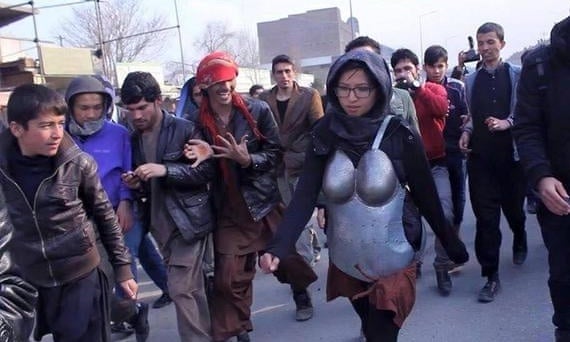

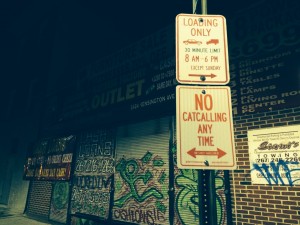

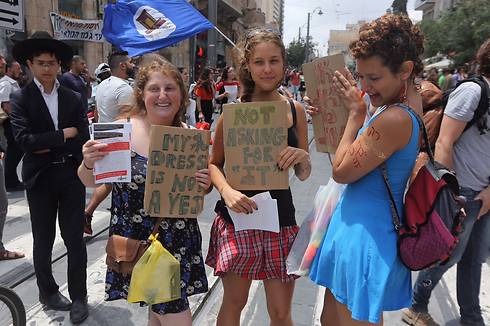



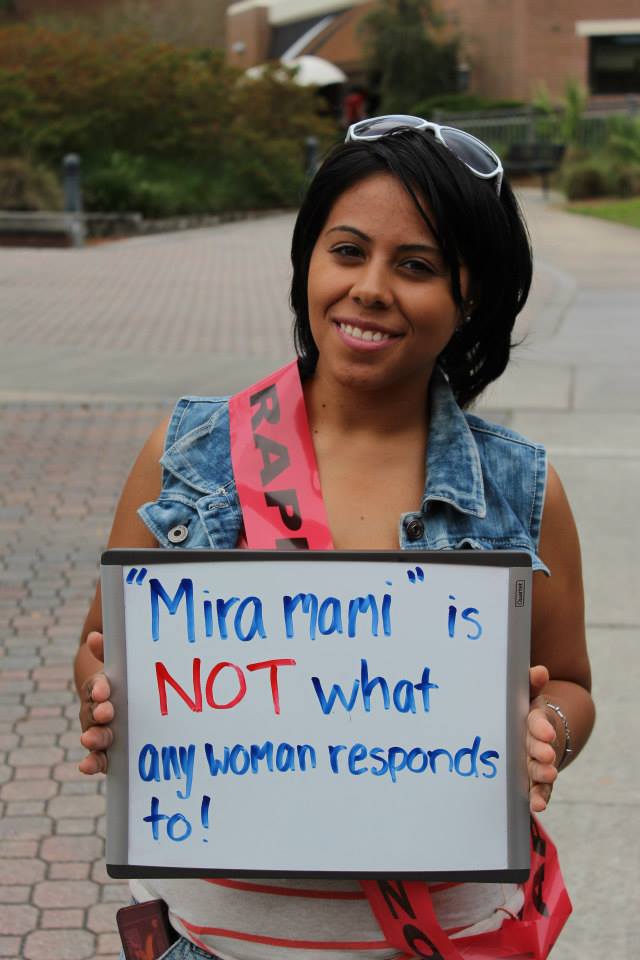
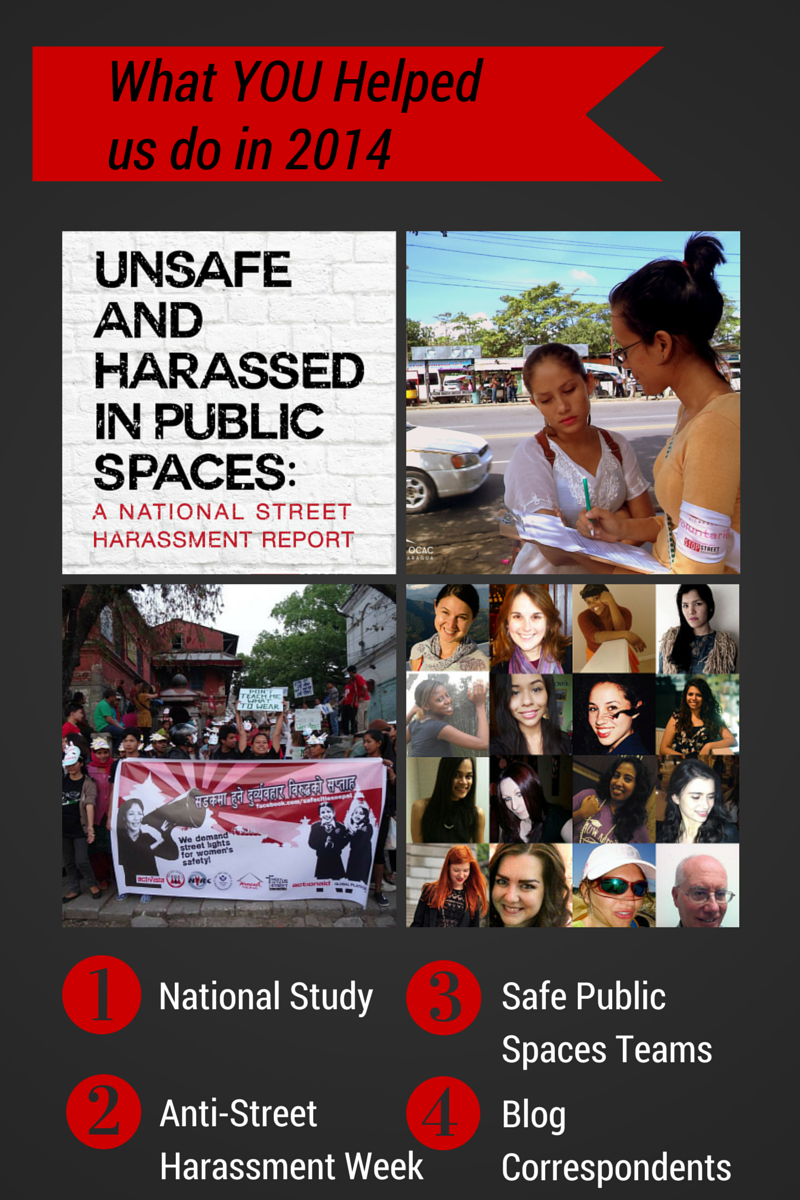
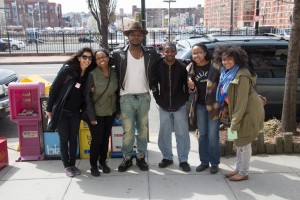 SSH board member Layla and volunteers in D.C. for sidewalk chalking
SSH board member Layla and volunteers in D.C. for sidewalk chalking SSH board member Laura in Nebraska for #16days of activism action on campus
SSH board member Laura in Nebraska for #16days of activism action on campus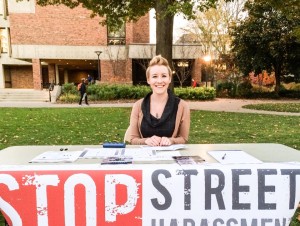 SSH board member Lindsey in Minnesota tabling after her talk at a campus
SSH board member Lindsey in Minnesota tabling after her talk at a campus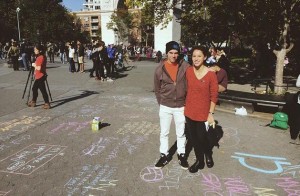 SSH volunt
SSH volunt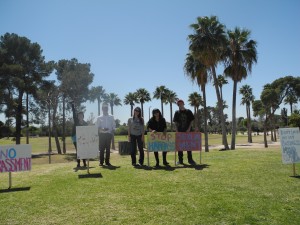 I joined SSH board member Manuel in Arizona for art action with high schoolers
I joined SSH board member Manuel in Arizona for art action with high schoolers
